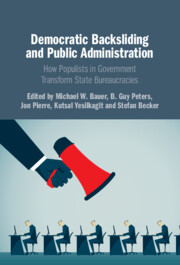 Democratic Backsliding and Public Administration
Democratic Backsliding and Public Administration Published online by Cambridge University Press: 17 August 2021
Hungary represents perhaps the strongest example in the EU of what the professional literature has termed, among other things, “democratic backsliding” or “illiberal regression.” The chapter uses the analytical framework of the Introduction to analyze how Hungary’s system of governance has been transformed in the current illiberal (post-2010) era. More specifically, it enquires whether the theoretical expectations regarding the direction and nature of this transformation are corroborated by the Hungarian case. Relying on the empirical material interviews conducted with senior civil servants of the central administration, the chapter endeavors to describe both the formal and informal elements of administrative changes. The findings are rather reassuring in terms of the empirical relevance and descriptive power of the framework proposed in this book. The model offered a meaningful theoretical framework for studying and interpreting illiberal administrative reforms in Hungary. Furthermore, several expectations stemming from the model were corroborated by the empirical data, including increased centralization and patronage, as well as the culture of distrust towards the bureaucracy.
To save this book to your Kindle, first ensure [email protected] is added to your Approved Personal Document E-mail List under your Personal Document Settings on the Manage Your Content and Devices page of your Amazon account. Then enter the ‘name’ part of your Kindle email address below. Find out more about saving to your Kindle.
Note you can select to save to either the @free.kindle.com or @kindle.com variations. ‘@free.kindle.com’ emails are free but can only be saved to your device when it is connected to wi-fi. ‘@kindle.com’ emails can be delivered even when you are not connected to wi-fi, but note that service fees apply.
Find out more about the Kindle Personal Document Service.
To save content items to your account, please confirm that you agree to abide by our usage policies. If this is the first time you use this feature, you will be asked to authorise Cambridge Core to connect with your account. Find out more about saving content to Dropbox.
To save content items to your account, please confirm that you agree to abide by our usage policies. If this is the first time you use this feature, you will be asked to authorise Cambridge Core to connect with your account. Find out more about saving content to Google Drive.